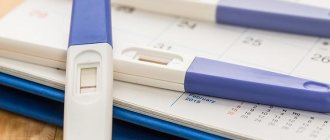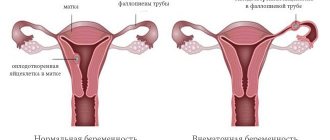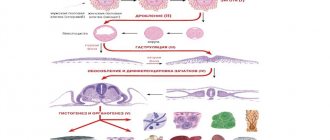How to understand that you are pregnant in the early stages is a question that every woman asks. A few simple tips will help expectant mothers determine pregnancy, starting from the first or second day after conception. Some symptoms appear after a week.
Women perceive pregnancy differently. For some, this is a long-awaited gift, others have already become accustomed to this condition, and still others are afraid to even think that they will soon have a child. Despite the feelings with which women feel about their situation, each of them should know how to understand that she is pregnant at an early stage .
Conception hormone or who helps determine pregnancy
A woman's pregnancy determines her menstrual cycle. Conception usually occurs after ovulation on the second day. Sometimes this happens the next day. After the start of menstruation, a new egg matures and prepares to be released from the ovary. If the menstrual cycle is 28 days, then the cell is ready for fertilization on the 14th day. If the cycle is thirty days, then ovulation occurs on the 15th day. On the second day after ovulation, the body is ready to conceive. It stays in this state for about a week (from 7 to 9 days). It is during this period that the basal body temperature increases to +37 degrees. If fertilization does not take place during this period, the temperature drops and the body returns to normal functioning.
If the egg is fertilized, it moves through the fallopian tube, divides, and after a week-long journey begins to secrete the hCG hormone. When it accumulates in the body, it becomes possible to determine pregnancy using tests or a blood test.
A blood test for hCG gives an accurate result 5-8 days after conception. Today, this is the most reliable method for determining pregnancy at an early stage, before the onset of menstruation.
An increased level of hCG can also occur during cancer, after childbirth or an induced abortion. All of these factors must be taken into account when conducting this analysis.
LiveInternetLiveInternet
Everyone knows that pregnancy can be determined not only with a test. There are specific signs, the presence of which with a high degree of probability means that a woman is expecting a baby. What are these signs?
This is the very first sign that makes a woman wary and assume pregnancy. If your period does not come within 3-4 days after the expected period, you need to be very attentive to your feelings and observe if there are any other signs that you are “in a position.”
A delay does not always mean pregnancy. For many women, the menstrual cycle is disrupted and not regular. In addition, a delay in menstruation can be caused by stress, diets and certain diseases.
2-3 weeks after conception, a woman may notice that her breasts are swollen and heavier. Touching her can be quite painful. These changes are caused by hormonal changes occurring in the body of the expectant mother.
Most women experience toxicosis during pregnancy. It is accompanied by nausea, vomiting and poor health. It is felt most acutely in the morning and while cooking.
Very often, a pregnant woman feels pain in the lower abdomen, similar to that that accompanies the onset of menstruation. But the critical days themselves do not come.
Another sign of pregnancy is clear, odorless discharge. They are similar to the discharge during ovulation, but there is much more of them.
After conception, a woman begins to go to the toilet more often than usual. If urination is not accompanied by pain or burning, then most likely this is a sign of pregnancy.
Emotional swings, tearfulness and irritability often accompany a woman expecting a baby. Such mood changes are associated with hormonal changes. They often affect a woman’s libido: it increases several times or, conversely, decreases.
Very often, the expectant mother's taste habits change. Favorite foods are disgusting. I want to try something new and unusual. Sometimes a woman has strange desires: to lick soap, chew chalk or eat an orange peel.
If you find yourself with one of the above symptoms, then you probably don’t need to worry about pregnancy. But if there are several signs, then you need to visit a doctor as soon as possible. Only he can give a final answer to the question of whether you are expecting a baby.
To determine pregnancy in the early stages, there are several so-called indirect signs, which our online magazine will tell you about, highlighting the most obvious ones.
How to understand that you are pregnant in the early stages: slight discharge, nausea, changes in taste preferences, aversion to smells, low blood pressure
The first signs of pregnancy include one of the most obvious - small discharge. Discharge may occur during the first two weeks of pregnancy, and the discharge is very scanty, often light yellow or pale pink in color. Such discharge often occurs when a fertilized egg attaches to the wall of the uterus.
You may not notice, however, in the early stages of pregnancy you may feel a little nauseous, irritated by strong odors, and you may want something special. But these first signs of pregnancy may not always appear in everyone.
Another sign of pregnancy in the early stages is sudden dizziness, fainting, weakness, all this is a consequence of low blood pressure. The beginning of hormonal changes in the body can also provoke headaches and insomnia.
How to understand that you are pregnant in the early stages: fever, breast swelling, discomfort in the lower abdomen.
A universal sign of pregnancy in the first two weeks is also considered to be an increase in basal temperature above 37 degrees. This temperature often gives a feeling of malaise and lethargy.
In the first weeks after conception, a young mother's breasts become very sensitive and often swell, and the pigmentation of the skin around the nipples may also change.
Often at the beginning of pregnancy, young mothers, even without knowing they are pregnant, notice discomfort in the lower abdomen. complain of heaviness and unusual tingling sensations. All this may be associated with the process of attachment of the egg to the wall of the uterus and its gradual increase.
How to understand that you are pregnant in the early stages: frequent urge to urinate, intestinal disorders
Frequent urination may also indicate pregnancy. If in the second half of pregnancy such frequent urination is explained by the pressure of the fetus on the genitourinary organs, then at the beginning of pregnancy everything is explained by hormonal changes in the body. An increase in the level of female sex hormones, in turn, increases the flow of blood to the pelvic organs, which temporarily changes the functioning of the bladder.
In the first trimester of pregnancy, intestinal disorders often occur. There is bloating, increased gas formation, and constipation. Female sex hormones, preventing the tone of the uterus, also inhibit peristalsis, making the intestines lazy.
Very often a woman feels her pregnancy subconsciously. Some expectant mothers even dream about their baby. The interpretation of dreams for pregnant women is also an interesting topic that concerns expectant mothers no less than the question of how to understand that you are pregnant at an early stage.
So, how do you know if you're pregnant early? If you have at least half of the above symptoms, you may be pregnant! We advise you to verify this by doing a regular test in the first days of your missed period.
for pregnancy.
In order to find out whether you are pregnant or not, there are tests that show 100% results. But the test gives a high result only after several days of delay in menstruation. And even the most experienced gynecologist will not see a few days of pregnancy. How to understand that you are pregnant without a test, especially in the early stages?
- In the first weeks and days of pregnancy, scanty discharge ranging from yellowish to pale pink may appear. This symptom often occurs when
an egg that is fertilized attaches - Sometimes nausea and intolerance to certain smells occur, but this is individual and does not affect everyone. This is the so-called toxicosis phenomenon. Toxicosis makes itself felt, mainly in the morning and during cooking;
- Blood pressure may drop and cause dizziness and fainting. This condition is not a defining moment, as it may be a manifestation of vascular disorders;
- With hormonal changes in the body, sleep disturbances and headaches may occur. Often there is excessive irritability and aggressiveness towards others;
- Slight (up to 37 C) increase in body temperature, malaise, apathy, weakness. Often these symptoms are treated by suspecting a cold. In the early stages of pregnancy, the use of medications can lead to serious complications. Before treating a cold, pregnancy must be ruled out;
- Breasts swell and become more sensitive - this is a change in hormonal levels;
- Unpleasant pulling sensations in the lower abdomen, this is due to the increase in the fertilized egg. If the pain is cutting and intense, consult a doctor immediately;
- Increased urination during hormonal fluctuations. If frequent, especially nighttime trips to the toilet “little by little” are accompanied by pain or burning, this is a reason to consult a urologist;
- Flatulence (bloating), constipation. Hormones inhibit intestinal motility to prevent uterine tone. The body reacts inadequately to many familiar foods.
- Place a drop of iodine on the surface of the glass with urine. If the iodine blurs immediately, there is no pregnancy. Iodine spreads with a delay, confirms pregnancy.
- Mix morning urine with red wine in equal
proportions. If there is no pregnancy, the fluid will become cloudy. If you are pregnant, the fluid will remain clear. - Lying on your back, place your fingers 7 cm below the navel. If you feel pulsation, you are pregnant. Healers believe that the pregnant uterus “forces” this particular area to pulsate.
- Listen to dreams. For many women, the presence of pregnancy is confirmed by a fish seen in a dream; for some, a mouse. By the way, according to many women communicating on forums, this is 100% confirmation of pregnancy.
Of course, these methods have no scientific basis. But there is an effect that has been tested by time and by many women.
Women who already have children usually accurately determine, even at short notice, the onset of pregnancy. Every woman's body is special and pregnancy can present with unexpected symptoms. Girls who suspect that they are pregnant should consult a doctor. Or wait until your period is late and use the test. You can watch your body. You can measure your vaginal temperature and monitor the results. You can use traditional methods. Only a gynecologist can accurately determine pregnancy. Even tests can sometimes not give an accurate answer and distort the result.
Are you wondering if you are pregnant? Some of the earliest signs of pregnancy begin to appear about a week after your period was due. According to statistics, 7 out of 10 women experience pregnancy symptoms only by the time they are already in their sixth week of pregnancy. In our article, we will give you ten signs that will help you understand that you are pregnant .
If you don't track your menstrual cycle, or if your cycle is not regular, you won't be able to tell when you ovulated and when your next period will start. However, if you start to experience some of the symptoms listed below, you may very well be pregnant. Buy a regular pregnancy test at the pharmacy to confirm your guesses, and also make an appointment with a gynecologist .
If you are pregnant, then it is not at all surprising that you feel disgusted by the smell of a sausage sandwich or a cup of coffee, and the aroma of some dishes even makes you gag. This is caused by a side effect of the rapid increase in levels of the hormone estrogen in your body. You may also notice that those foods that previously brought you pleasure suddenly become completely disgusting to you!
Typically, mood swings during pregnancy are caused by hormonal changes that affect the levels of neurotransmitters (chemical messengers in the brain). Each woman reacts differently to these changes. Some women are constantly emotional, while others, on the contrary, may become anxious or even depressed.
The hormonal changes that occur in early pregnancy can make you feel bloated. Therefore, your clothes may not feel very comfortable for you, especially at the waist, even in the early stages of pregnancy, despite the fact that your uterus is still quite small in size.
Very soon after you become pregnant, changes in your body's hormonal levels will increase the rate of blood flow through your kidneys. This causes your bladder to fill faster, so you'll visit the toilet more often. This symptom of pregnancy can begin to appear as early as the sixth week.
Frequent urination will continue, and even get worse, as your pregnancy progresses. While you're pregnant, your blood volume increases dramatically, causing extra fluid to build up and ultimately putting more strain on your bladder. The problem gets worse as your pregnancy progresses, as your growing baby puts more and more pressure on your bladder.
Do you suddenly feel tired? It's still not known for sure what exactly causes fatigue in early pregnancy, but it's likely a rapid increase in the hormone progesterone that makes you sleepy.
You'll begin to feel more energized as you enter your second trimester, although fatigue will likely return later in pregnancy as your weight increases and some of the discomforts of pregnancy make it difficult to get a good night's sleep. sleep.
One of the early signs of pregnancy is fullness, swelling and tenderness of the breasts, pain in the mammary glands, which is caused by an increase in hormone levels. You may experience breast tenderness and swelling, like an intensified version of the sensations in your breasts the night before your period. The feeling of discomfort should gradually decrease towards the end of the first trimester.
Some women experience morning sickness about a month after conception, but for some it begins within a week or two. Moreover, very often the feeling of nausea (often with vomiting) haunts pregnant women not only in the morning, but also during the day, and even at night! But how do I know that nausea is a sign that the body is letting me know that I’m pregnant ? and does not talk about banal food poisoning. It’s very simple - toxicosis of pregnant women does not go away in one day!
About half of pregnant women suffering from early toxicosis feel relief by the beginning of the second trimester of pregnancy. For most others, it takes about another month for the nausea to subside. And only a small percentage of pregnant women can boast that they have no signs of toxicosis at all!
If your menstrual cycle has always been regular, but is somehow delayed this month, then this is a reason to take a pregnancy test, especially if you have any other signs of pregnancy! But if you have irregular periods, or if you don't track your cycles, then nausea and breast tenderness may well indicate pregnancy before you notice a missed period.
If you are charting your basal body temperature (BBT) during your cycle and notice that your temperature remains elevated for 18 days in a row, then you are most likely pregnant.
Many pregnancy tests are not sensitive enough to 100% confirm the presence of pregnancy until a week after a missed period. Nevertheless, this is one of the most reliable signs by which you can understand whether you are pregnant . So if you take a test less than a week after your missed period and get a negative result, try it again in a few days. Remember that the baby begins to develop before you know you are pregnant, so take care of your health in advance. Once you get a positive result, go to an appointment with your gynecologist.
Sometimes a woman suspects pregnancy, but in the hustle and bustle of everyday life, most of the fairer sex simply do not have time to visit a gynecologist or take a test. In this case, the question arises of how to determine pregnancy without a test.
The female body is very individual and the signs of conceiving a child can be different for each person. But there are still certain signs that suit most women.
- Menstrual irregularities. This is the most famous sign of pregnancy, which a woman immediately pays attention to. But it is worth noting that the menstrual cycle may be disrupted due to climate change, taking certain medications or stress.
- Change in emotional state. During this period, a woman experiences irritability, fatigue, or attacks of apathy. The main thing here is to determine the woman’s condition, which is not typical for her during normal periods.
- Increased breast sensitivity. As a rule, already from the first weeks of pregnancy, a woman’s breasts swell, become very sensitive, and any touch to them can be accompanied by pain. Sometimes such signs can occur due to the use of birth control pills or hormonal imbalance.
- Nausea and vomiting. Nausea usually appears 3-8 weeks after conception.
- Frequent urination. If you start running to the toilet more than usual, you don’t feel pain during urination, and there are no abdominal pains, then you should look for the answer to the question of how to recognize pregnancy without a test.
- Increased appetite. A woman's craving for certain foods (salty or sweet) is also a symptom of pregnancy. Often these cravings continue throughout pregnancy.
All of these symptoms can be caused by pregnancy or other phenomena in the body.
The clearest way to determine pregnancy without a test is to measure basal temperature.
In order to correctly determine the presence of pregnancy by basal temperature, a woman must regularly measure it and know the features of her cycle. It should be noted that a woman’s menstrual cycle consists of two phases. During the first phase, the basal temperature is below 37 degrees. During the second phase, which follows ovulation, the basal temperature is above 37 degrees.
Typically, for most women, the menstrual cycle lasts about 28 days, that is, 14 days each phase. The duration of the first phase is variable, as it is associated with ovulation. The duration of the second phase is more constant. Therefore, if during the second phase the high temperature lasts more than 3 days, then there is a high probability of pregnancy.
When answering the question of how to find out if you are pregnant without a test, we can say that it is imperative to listen to changes in your body, sensations and measure your basal temperature.
Previously, when there were not so many modern means of determining pregnancy, they used folk remedies. It should be noted that the results of such methods were always reliable.
A pregnancy test using folk remedies was carried out using: urine, pulse, iodine and onion. Let's look at each method in more detail.
- Urine. It contains all the main information about the woman’s condition. Back before modern tests existed, urine could correctly indicate pregnancy. Nowadays, you can also take a homemade pregnancy test. To do this, soak a white sheet of paper in urine and drop a drop of iodine on it. If you are pregnant, the iodine will turn purple; if not, the iodine will turn blue. Pregnancy can also be recognized by the dark yellow color of urine both in the morning and in the evening.
- Pulse. You need to lie on your back and find a place on your stomach at a distance of 7-8 cm from the navel. If you feel a pulsation, you are in position. However, during pregnancy there may be no pulse.
- Iodine. For this method, you need to fill a small container with urine and drop one drop of iodine into it. If a drop of iodine remains on the surface, then you are pregnant. If the iodine begins to blur, then there is no pregnancy.
- Onion. This is a very fun method. Take two onions and plant them in different containers. Note for yourself: one bulb means you are pregnant, the other one means you are not pregnant. Then you need to wait until they grow to 4 cm. Which of the two bulbs grows first to 4 cm will answer your question, how to find out if you are pregnant without a test.
The choice is yours - to use modern methods or seek help from folk remedies to determine pregnancy. But in any case, if the result is positive, let your pregnancy
will be welcome.
What to look for: main symptoms
How to find out about pregnancy long before your period without tests? This question torments many representatives of the fair sex. A pregnancy test during this period does not always show a true result; the doctor won’t even talk to you yet, but you really need to know.
Every woman, if she knows her body and loves herself, can detect pregnancy in the first week. There are so many symptoms that only an exhausted worker with many children or a young student would not understand what they indicate.
- The first signal is aching chest. It looks like it is being pierced by small needles. This is a completely different pain than the one that comes with menstruation. Many nulliparous women cannot touch their breasts in the first week. Particular discomfort occurs if you lie on your stomach. It is the group of women who are accustomed to sleeping on their stomachs who pay attention to this symptom first.
- Increasing circular pain in the lower abdomen and back also indicates pregnancy. The pain intensifies in the afternoon: the pain is strongly felt after lifting a bucket of water or getting up from the sofa, after sleep.
- Frequent urge to go to the toilet and a feeling of a full bladder. It seems that this will happen now, but in fact there is almost no urination or it is difficult and jerky.
- Toxicosis rarely appears from the first days, but morning sickness can appear from the second day of pregnancy. Some women experience severe vomiting after sleep.
- A reaction to odors also appears from the first days of pregnancy: some people don’t like their favorite coffee because it smells bad. Others detect unpleasant aroma in food or cosmetics.
- During pregnancy, the hormone progesterone increases. It increases your basal temperature. During pregnancy it rises, starting from 37.2 degrees.
It is important to understand that it is approximately the same during ovulation, so this indicator can be confusing if a woman does not keep a calendar of her monthly cycle.
- A pregnancy test will give the correct result on the first day after the delay. It is able to show the correct result even in the early stages, but sometimes failures occur and the second strip is not drawn clearly.
- Copious discharge from the genitals appears. It is important not to confuse discharge during pregnancy with those that appear during thrush. In the latter case, they will be cheesy and have an unpleasant odor.
- Thrush often accompanies pregnancy in the first weeks. Before treatment, it is necessary to find out whether you are pregnant or not in order to decide on the choice of drugs.
- In the first weeks after conception, the level of hormones in the female body rises and sexual desire sharply increases. Such changes can also be a symptom of pregnancy.
Ultrasound can show only an enlarged uterus at an early stage. But in the early stages, this study will not be prescribed by a doctor, and it is done only at the request of the woman. The doctor will not dare to say anything specific before the date of your period.
It often happens that you need to reassure yourself and make sure that you are not pregnant, but it takes a long time to get to the hospital and pharmacies. This can be done in simple ways.
Determining pregnancy in the earliest stages
Basal temperature measurement
Basal temperature is an important indicator that will help a woman find out about the onset of ovulation or pregnancy. The temperature is measured in the anus, vagina or mouth. It changes under the influence of changes in a woman’s hormonal levels during pregnancy and ovulation. Such a measurement will help a woman control not only the origin of life inside, but also be aware of hormonal changes that may be unhealthy.
What is the temperature during pregnancy?
At the beginning of ovulation, the normal basal temperature in women is 37.2 degrees. When planning children, this indicator is important to take into account.
When pregnancy occurs, the possible temperature range is from 37.1 degrees to 37.3.
Please note that if a pregnant woman’s basal temperature drops to 37 degrees or lower, this means that the level of progesterone in the body has dropped. This can lead to early miscarriage. Therefore, if you have already had spontaneous abortions, then during your next pregnancy it is advisable to monitor this indicator.
Soda test
Soda is a good helper in all household chores. She will help out this time too. You need to take a glass of morning urine (medium collection), put a spoonful of soda in it and observe its reaction.
If the soda starts to hiss and bubbles appear in the glass, you are definitely not pregnant. When the soda just sinks to the bottom of the glass, there is a high probability of pregnancy.
The urine of pregnant women has high alkalinity, at which soda does not react, but will precipitate. In the opposite case, urine is a highly acidic environment, and the soda reacts by fizzing and forming bubbles.
High alkalinity of urine occurs not only in pregnant women, but also in vegetarians, with inflammation of the urinary tract, diarrhea, and vomiting.
How to tell if you're pregnant without a test
03.28.2014Category: PregnancyLeave a comment
In order to find out whether you are pregnant or not, there are tests that show 100% results. But the test gives a high result only after several days of delay in menstruation. And even the most experienced gynecologist will not see a few days of pregnancy. How to understand that you are pregnant without a test, especially in the early stages?
Early signs of pregnancy
- In the first weeks and days of pregnancy, scanty discharge ranging from yellowish to pale pink may appear. This symptom often occurs when an egg that is fertilized attaches to the wall of the uterus;
- Sometimes nausea and intolerance to certain smells occur, but this is individual and does not affect everyone. This is the so-called toxicosis phenomenon. Toxicosis makes itself felt, mainly in the morning and during cooking;
- Blood pressure may drop and cause dizziness and fainting. This condition is not a defining moment, as it may be a manifestation of vascular disorders;
- With hormonal changes in the body, sleep disturbances and headaches may occur. Often there is excessive irritability and aggressiveness towards others;
- Slight (up to 37 C) increase in body temperature, malaise, apathy, weakness. Often these symptoms are treated by suspecting a cold. In the early stages of pregnancy, the use of medications can lead to serious complications. Before treating a cold, pregnancy must be ruled out;
- Breasts swell and become more sensitive - this is a change in hormonal levels;
- Unpleasant pulling sensations in the lower abdomen, this is due to the increase in the fertilized egg. If the pain is cutting and intense, consult a doctor immediately;
- Increased urination during hormonal fluctuations. If frequent, especially nighttime trips to the toilet “little by little” are accompanied by pain or burning, this is a reason to consult a urologist;
- Flatulence (bloating), constipation. Hormones inhibit intestinal motility to prevent uterine tone. The body reacts inadequately to many familiar foods.
Traditional methods for determining early pregnancy
- Place a drop of iodine on the surface of the glass with urine. If the iodine blurs immediately, there is no pregnancy. Iodine spreads with a delay, confirms pregnancy.
- Mix morning urine with red wine in equal proportions. If there is no pregnancy, the fluid will become cloudy. If you are pregnant, the fluid will remain clear.
- Lying on your back, place your fingers 7 cm below the navel. If you feel pulsation, you are pregnant. Healers believe that the pregnant uterus “forces” this particular area to pulsate.
- Listen to dreams. For many women, the presence of pregnancy is confirmed by a fish seen in a dream; for some, a mouse. By the way, according to many women communicating on forums, this is 100% confirmation of pregnancy.
Of course, these methods have no scientific basis. But there is an effect that has been tested by time and by many women.
Women who already have children usually accurately determine, even at short notice, the onset of pregnancy. Every woman's body is special and pregnancy can present with unexpected symptoms. Girls who suspect that they are pregnant should consult a doctor. Or wait until your period is late and use the test. You can watch your body. You can measure your vaginal temperature and monitor the results. You can use traditional methods. Only a gynecologist can accurately determine pregnancy. Even tests can sometimes not give an accurate answer and distort the result.
Here is a very useful video on how to understand that pregnancy has occurred:
Thanks for sharing with your friends!
The first signs of multiple pregnancy
Some consider the conception of two or more children to be a gift from above, and some call it a test. In any case, this news is always somewhat shocking for parents. You can suspect such a pregnancy based on the following signs:
| Appearance | A change in appearance for the worse, associated with colossal hormonal changes, as well as due to toxicosis. The peculiarity is the appearance of acne on the face. |
| Increased urination | Increased urination already in the 3rd week of pregnancy due to the accelerated growth of the uterus |
| Appetite | Appetite is most often increased, despite nausea. Even if appetite suffers due to toxicosis, weight is gained well and quickly. |
| Nausea | Severe and painful nausea with periodic vomiting, which practically does not go away throughout the day, from the first days after conception. |
| Mood | Decreased mood due to constant fatigue and drowsiness. Any habitual task is given with great difficulty. |
| Stomach | Uniform slight rounding of the abdomen from the first weeks, occurring due to increased growth of the uterus. The symptom may not appear in everyone. |
Author:
Sabuk Tatyana Leonidovna hygienist, epidemiologist
Subjective feelings of a woman
The first signs of pregnancy before the delay, felt subjectively, can be noted by every expectant mother at the beginning of pregnancy, since incredible changes are already taking place inside the body, invisible to the eye, but revealing themselves through certain features of sensations. Women suffering from PMS may experience many of these symptoms (see symptoms of premenstrual syndrome and differences from pregnancy), but similar symptoms and changes may be felt almost immediately after conception. Moreover, if a woman does not suffer from PMS, then such changes can be mistaken for unusual ones.
| Malaise | Malaise in the first days of pregnancy can be mistaken for a mild cold, only without respiratory symptoms. There is rapid fatigue and tiredness |
| Emotional destabilization | Tearfulness, replaced by euphoria, joy and tears at the same time are frequent companions of developing pregnancy, especially in emotional and impressionable women |
| Drowsiness and restless sleep | Drowsiness and a feeling of lack of sleep are signs of pregnancy in the first days. There is a constant desire to sleep, but even a 12-hour sleep does not bring the feeling that the woman has had enough sleep. Characterized by sudden awakening early in the morning and inability to fall back to sleep |
| Change in libido | A change in libido, either increasing or decreasing, can be observed throughout pregnancy and begins from 2-3 weeks |
| Heaviness in the pelvic area | The feeling of fullness in the pelvic area due to increased blood flow to the pelvic structures is perceived by many women as the feeling of their own uterus |
| Tingling in the uterus | There are periodic mild tingling sensations in the area of the uterus |
| Lower back pain radiating to legs | Periodically there is pain in the lower back, similar to lumbago, radiating to the legs |
| Headaches, migraines | The headache may persist throughout the day and subside only at night |
| Increased or changed breast sensitivity | Excessive sensitivity of the mammary glands, manifested as a reaction to the slightest touch, pain is observed in most pregnant women. In some cases, a woman practically cannot touch her breasts - these unpleasant sensations are so strong. Loss of sensitivity is observed in those pregnant women who previously experienced increased breast sensitivity before menstruation |
| Feeling hot and cold | The feeling of suddenly feeling hot and then starting to shiver overwhelms a woman several times a day. Moreover, these sensations are internal and do not depend on external factors (weather, clothing, ambient temperature) |
| Increased appetite or strong cravings for certain foods | Many women note a brutal appetite and literally cannot move away from the refrigerator, since what they eat does not give them a feeling of satiety. Cravings for certain foods and drinks begin already at the beginning of pregnancy, and it is impossible not to notice this, since the pregnant body often chooses as a priority foods those that were previously absent from the diet |
| Nausea | Attacks of nausea, especially in the morning, which can lead to vomiting. Characterized by aversion to certain foods, memories of which automatically cause nausea |
| Increased sensitivity to odors and distortion of the olfactory senses | Rejection and even aversion to previously familiar smells - perfumes, cooked food, spouse's body, etc. Against this background, a craving for chemical odors (gasoline, acetone) may appear. Interestingly, some women begin to smell an atypical odor from products, for example, the smell of oil from fruits. These first signs of pregnancy appear 3-5 days after conception, the woman immediately notices unusual olfactory sensations |
| Discomfort while sitting | Literally from the first days of pregnancy, it is difficult for the expectant mother to find a comfortable position in a sitting position; the feeling that something is in the way does not leave the woman, which forces her to fidget in her chair and change her position |
The very first signs of a possible pregnancy after a delay
First, let's find out whether a missed period is a sign of pregnancy? Undoubtedly, this is the main symptom from which doctors start in further diagnosis. Girls often find it funny that pregnancy is a “diagnosis,” but how else can they determine the new position? Infection with foreign sperm? Even funnier, but it is the word “pregnancy” and the number of weeks that is written in the “diagnosis” column.
Although pregnancy is not a disease, but a condition, the first symptoms in the early stages are very vague, often phantom.
It is easy to mislead even an inexperienced gynecologist. Therefore, girls sometimes manage to take an exemption from sports activities and even reschedule exams, citing early toxicosis in the medical office, when there are 1 day of delay without signs of pregnancy. But it’s even easier to get confused yourself, for example, when a successful conception has actually occurred, after which discharge on the underwear is possible, similar to menstrual blood. Most often they differ in color and intensity - scanty periods of a pinkish or brown tint. This is the result of implantation of the fertilized egg into the uterine mucosa or discharge from the urethra during cystitis.
To be sure, you need to rely on other signs of pregnancy after a missed period:
- Elevated basal temperature when measured in the morning with a rectal thermometer is in the range of 37-37.2 ° C, it does not fall from the day of ovulation during the first trimester.
- Absence of menstruation or their meager imitation (not the most reliable sign if there are pathologies of the reproductive system).
- Breast changes - the mammary glands become slightly enlarged, swell, the nipples become very sensitive, touching them is painful, and the tubercles along the edges of the areoles become puffy. Women's breasts are sensitive to hormonal changes, sometimes the delay is 8 days, there are no signs of pregnancy yet, but all bras become 1 size too small.
- Hyperpigmentation, which is noticeable at a quick glance - breast halos darken, age spots appear in other places (central line on the stomach, freckles and red spots on the face and back).
- The enlarging uterus puts pressure on nearby organs, and there is a frequent urge to urinate at night, although I have never had to get up to go to the toilet at night before. Even if it is too early to talk about such a sign of pregnancy after a delay of 5 days, then it will become more obvious. These urges are provoked by the fertilized egg and its hormone hCG. The uterus also puts pressure on the intestines, causing problems with bloating and constipation.
- Changes in hormonal levels during the birth of a new life affect the body’s new demands in terms of changes in taste preferences. She has a craving for salty foods or a pathological craving for sweets, if she has experienced such “whims” before. Often this symptom is accompanied by a sharp exacerbation of the sense of smell and aversion to certain odors. For example, until this moment the woman did not know what cats’ marks smell like, and suddenly a “dog’s scent” appears. This doesn’t happen to everyone, but without pregnancy “suddenly” this cannot happen.
- A strange aftertaste in the mouth, a metallic or acidic taste on an empty stomach, which has not been observed before. This is a dubious sign, but it is taken into account in the list of deviations that have not previously been observed.
- Fatigue, apathy, drowsiness, loss of interest in the usual way of life are typical signs of pregnancy after a missed period. The body abruptly adapts to bearing a fetus, which takes a lot of energy.
- Immunity decreases, vulnerability to colds, E. coli and infections appears, which the body can easily cope with.
Important: Single manifestations, symptoms and signs of pregnancy during a delay are possible under other circumstances, so they are considered comprehensively.









